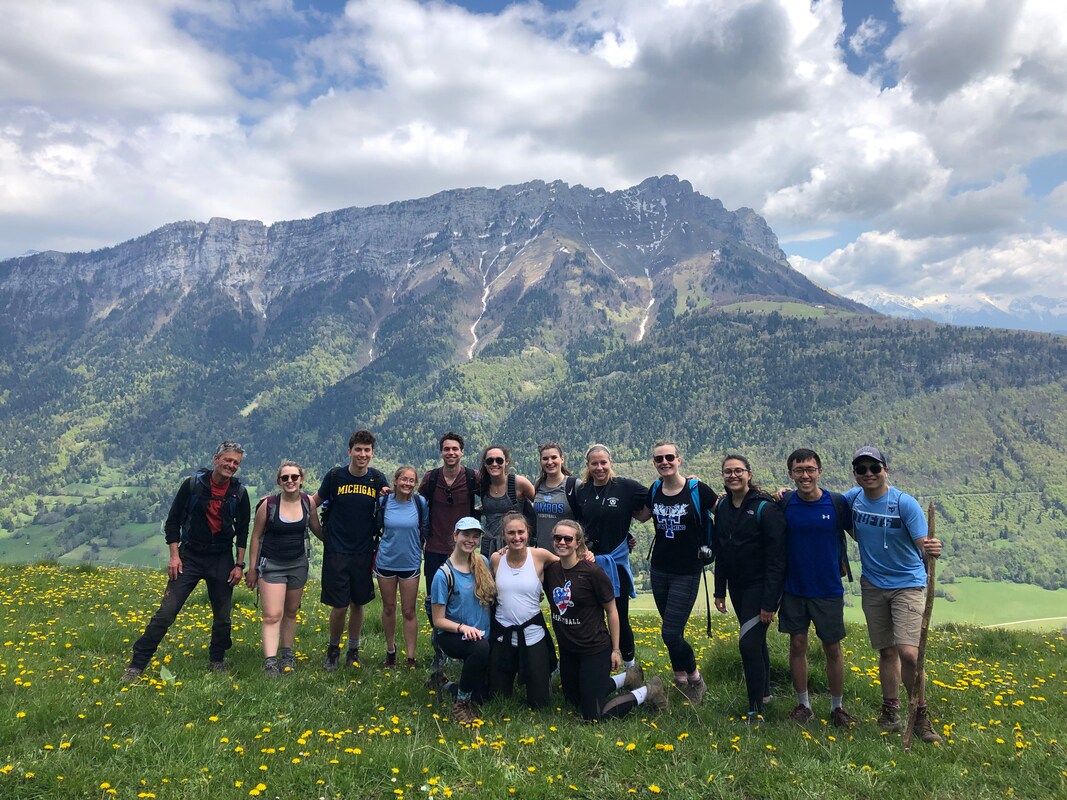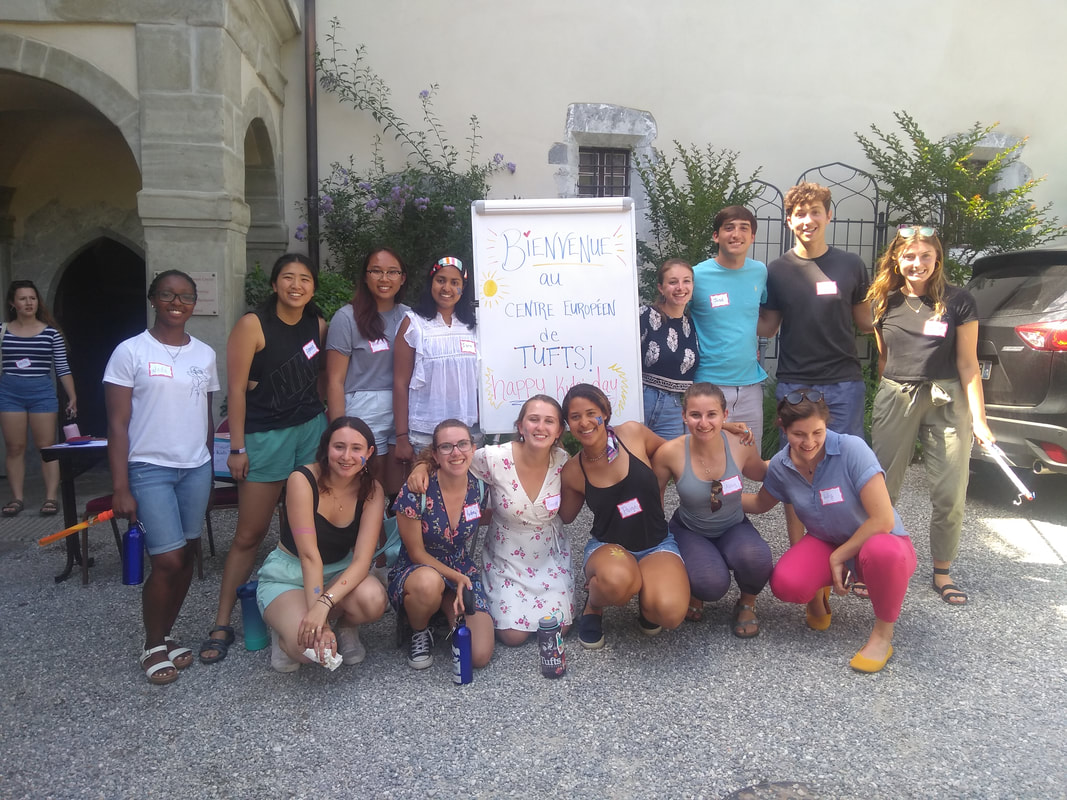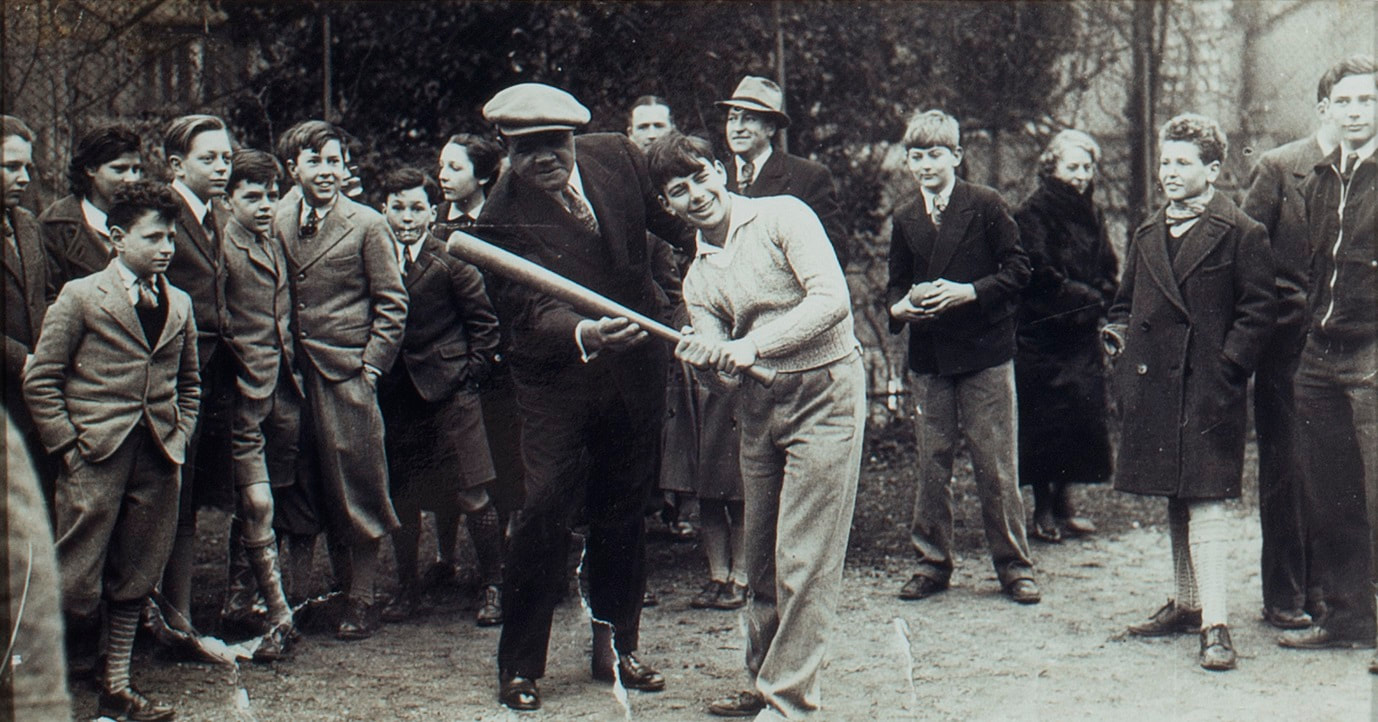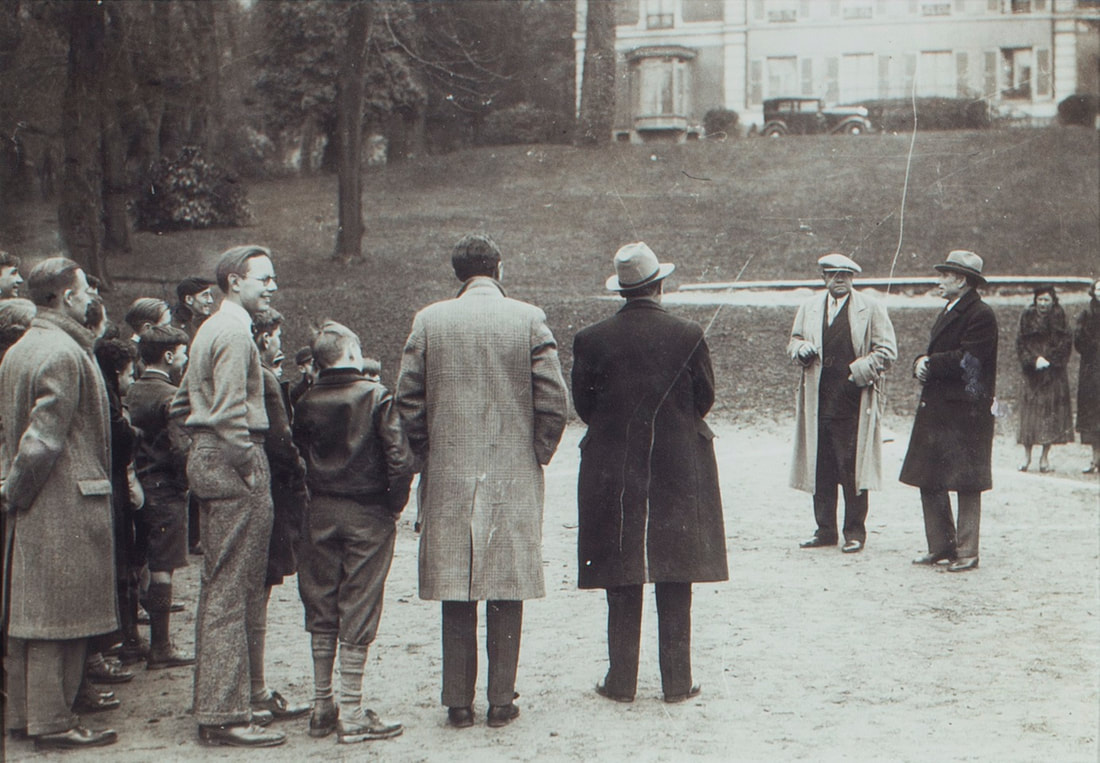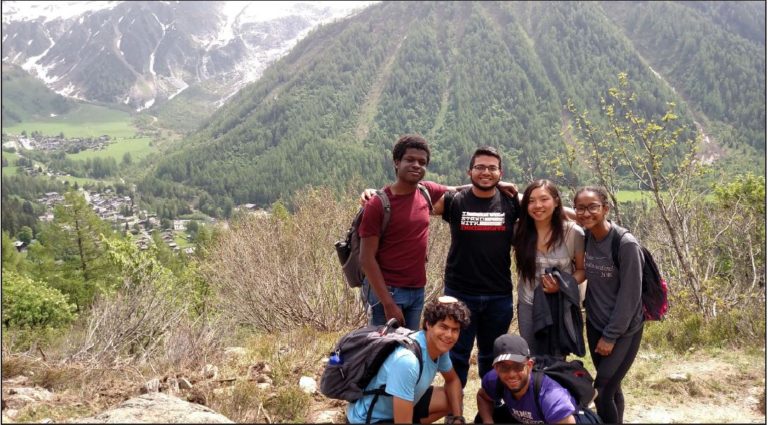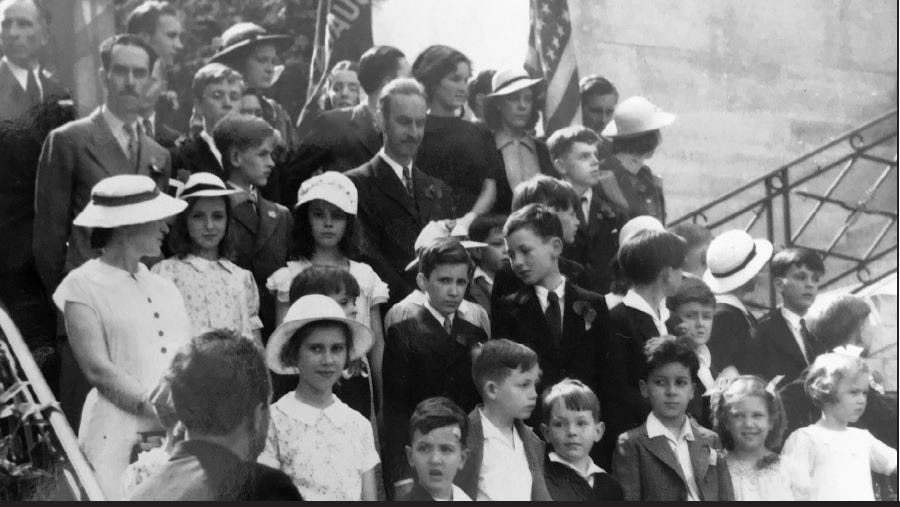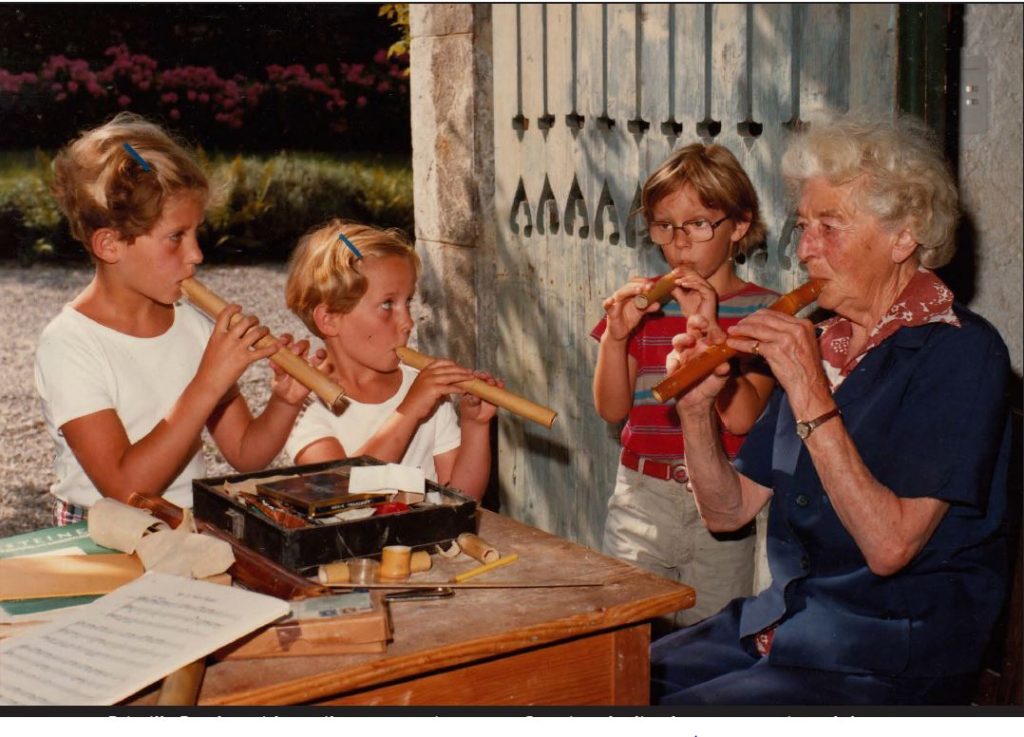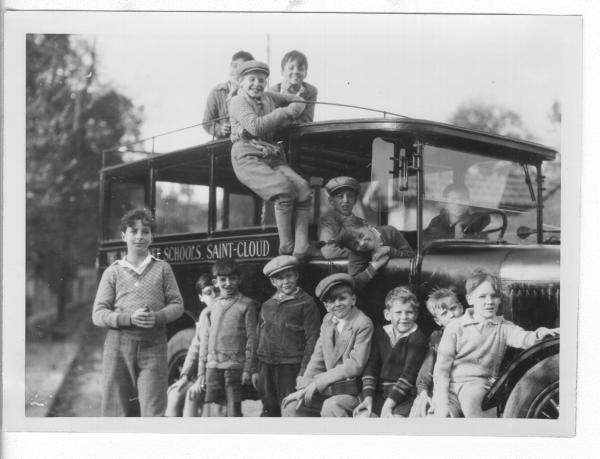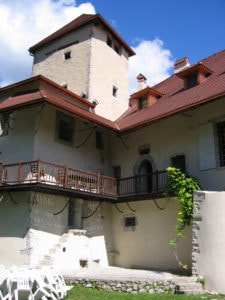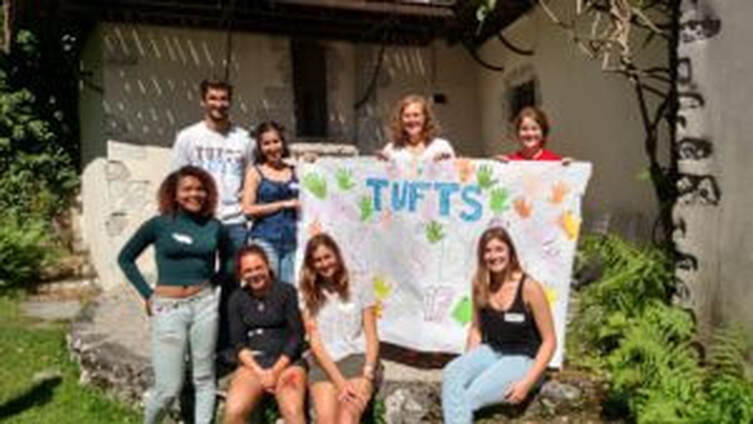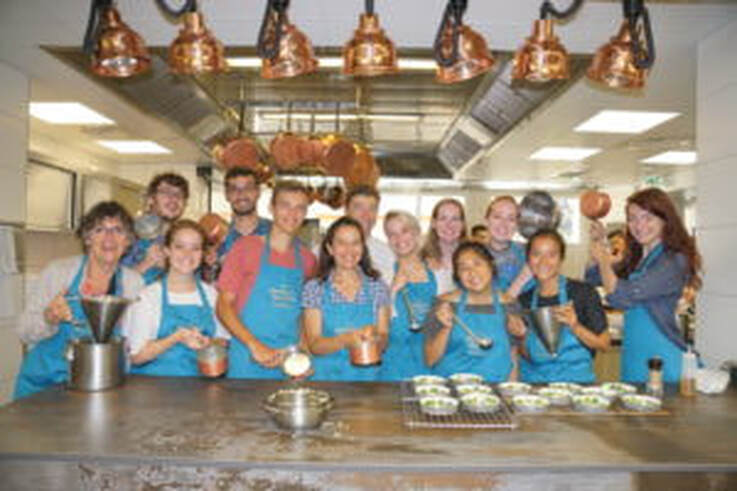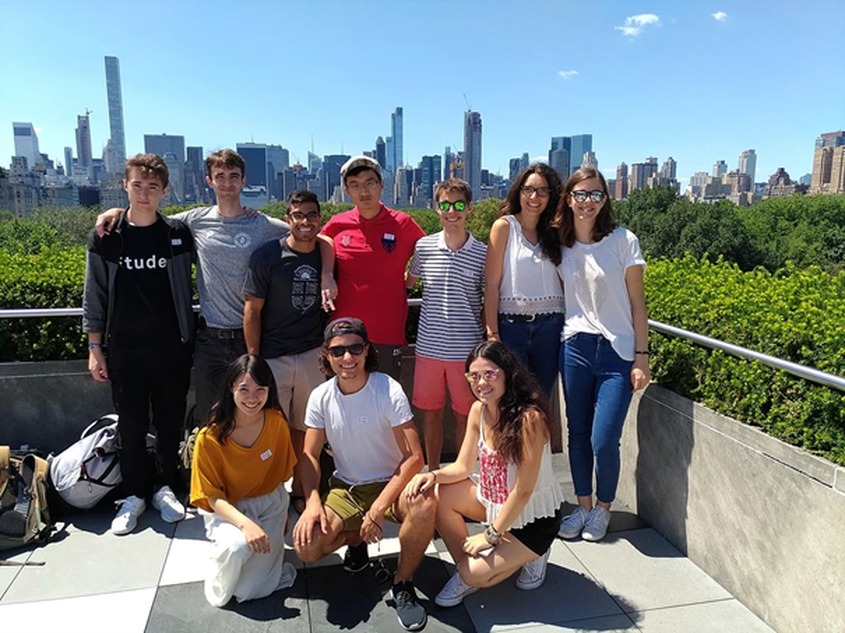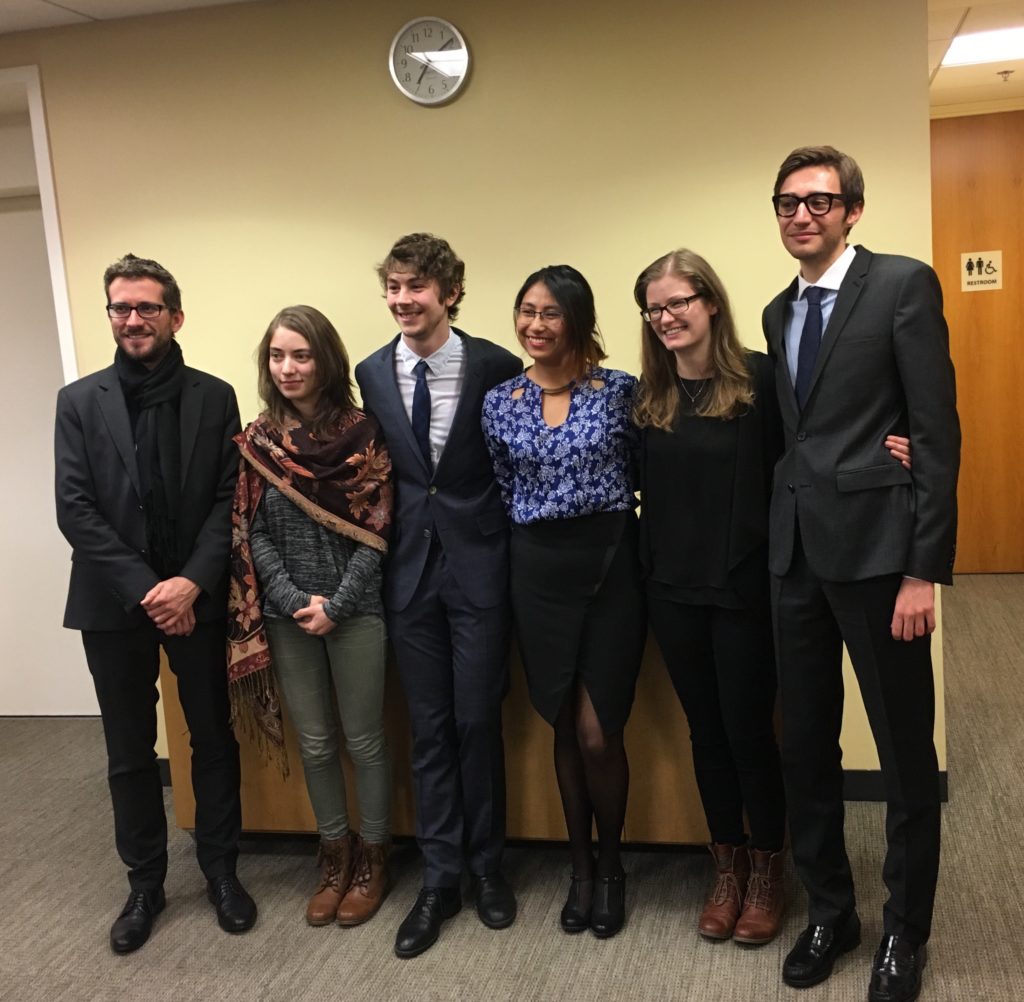
|
MacJannet Scholars recall Tufts in Talloires, summer 2019 GABRIELLA GOLDSTEIN Every summer, the Tufts University European Center organizes the Tufts in Talloires program, a six-week academic program for Tufts undergraduate students. Its students— 84 in summer 2019— receive a unique combination: two credit-bearing Tufts University courses from a range of disciplines, plus the opportunity to live with a French host family and inhale firsthand experience of French culture. In keeping with Donald MacJannet’s belief in learning by experiencing, all the classes offered in Talloires connect in some way with the Haute-Savoie region to give students an experiential component to their coursework. As students have become more globally minded, the popularity of our program has grown. The Tufts in Talloires Program has become an important (and sometimes the only) vehicle for Tufts students to live abroad and to discover the world beyond what they’ve always known. The MacJannet Foundation has been instrumental in making this possibility a reality for many students through its generous annual support of the Tufts European Center’s scholarship fund. Last summer, the MacJannet Foundation’s grant of $38,000 helped the European Center offer financial support to 26 students who might not otherwise have been able to travel to Talloires. These “MacJannet Scholars,” in turn, help ensure a more diverse student community for the Tufts in Talloires Program, something that enriches our own community while also teaching our French neighbors and hosts about the richness and diversity of American students. Every year, we on the Tufts staff see how six weeks in Talloires can exert a profound and long-lasting impact on students’ lives. Last summer’s MacJannet Scholars reflected on their experiences. Excerpts of their comments are below. Gabriella Goldstein has served as director of the Tufts University European Center in Talloires, France, since 2002. Misgivings averted I was originally very hesitant about coming, because six weeks is a long time, I don’t speak French, and I was nervous about classes. Looking back on my time here, it would have been a huge mistake not to come. I have met so many people that I otherwise would not have met at Tufts, and the memories I have made here are irreplaceable. Outdoor activities I loved being in Talloires. I loved that everyone wanted to be active and outside all the time. There were so many activities to participate in. I went hiking a few times, swam in the lake on every sunny day, and made a lot of new friends. Liberating experience Being in Talloires is very freeing. It teaches you more than you could think about what you value in life, particularly outside of academics. Developing confidence Overall, the Tufts in Talloires program did force me to get out of my comfort zone and interact with new people. While this was occasionally overwhelming, it has taught me how to have greater confidence in myself. More relaxed than Medford A great opportunity to immerse yourself in a different culture, eat French cuisine, talk to locals, hike up the Alps, and take a course in a more relaxed environment than what you would experience in Medford. No more beautiful place There is no more beautiful place in the world to dive head first into fast-paced but extremely interesting courses. Beyond my major The classes I took were super interesting. I loved learning about topics outside my major, like art history and alpine flowers! Family, friends, freedom I had a lovely time exploring the city of Annecy, the town of Talloires, and other surrounding areas (Lyon, the mountains in this region, parts of Italy, etc.). My host family also greatly enhanced my experience by allowing me to join in on their plans if I wanted, but also giving me the freedom to do whatever I wanted. Kindness = Happiness Everyone was super kind and happy to be there! It has always felt like such a healthy, pure, and friendly environment, which just creates a feeling of happiness. New friendships I formed friendships that I never would have otherwise, despite my worries that I didn’t know enough people before I got here. Biking and hiking Some highlights for me were biking around the lake, going on some of the hikes, and trying all the amazing food. Supportive community The staff and other Tufts students are here to help you through all the uncomfortableness of being in a new country. It is incredible how many people I have met through this program that I had no idea were at Tufts. I cannot wait to go back to campus and see all of them. Flowers and children I loved interacting with the kids of the village and hiking in my flowers class. Flowers class made me feel like a little kid again, because I haven’t had such an immersive science experience since elementary school. One of the most special experiences I had was visiting my host dad’s class of six-year-olds and reading books to them. Trip of a lifetime I had the exquisite pleasure of living in this country for six weeks as someone who does not know a lick of French. I swam in the lake all the time, I studied for my classes, I explored old Annecy, I met new people and made new connections, accumulated new habits, and learned so much about myself. Life at a different pace The pace of life and culture in Annecy is really different from the States, which gives you a chance to slow down and reflect on life. The academics here are rigorous but fun. Exploring on my own Due to the location of my house, my commute was nearly an hour and a half. This meant that every day, twice a day, I got to experience Annecy and Talloires on my own. The lure of Talloires Talloires is truly a magical place. You will immerse yourself in a new culture and grow so much in just six weeks. You become a part of a family, both with your host family and with the students who are with you. Instead of junior year abroad…. It was especially nice because I made the decision not to go abroad during my junior year, and this ended up being the perfect fit for me. It was a great balance of the freedom of most abroad programs while also retaining the comfort of the Tufts community. More than food and mountains It would be a shame if someone comes to Tufts in Talloires only for cheese, wine, and baguettes. Exchange programs should do more than just confirm preconceived stereotypes. During my interaction with my host family, I learned so much about French political dynamics and cultural aspects, which are never mentioned outside of Europe. I think these cultural exchanges are the most valuable components of the program, rather than superficial concepts like food and mountains. Exploring on foot I lived in Les Granges, close to Talloires, and really enjoyed being so close to town. It was wonderful to walk to class and go to the beach afterwards, or have picnics with my host family by the lake. It was amazing to get to study in such a tranquil and idyllic place. All this in one program I was immersed in French culture and everyday life with my host family and learned more about what makes the Haute-Savoie region so unique. I met students and faculty whom I might not have crossed paths with back in Medford, and I spent time resting or reading by the beach. And I did this all within the comforts of a Tufts-run program, which made it easy to adjust to. My new normal It still blows my mind, walking to school each morning, that these views, these people, this food have all become my normal daily routine. Trying new foods I loved hiking, lying out on the plage, wandering around Annecy, and trying new foods (I tried duck, rabbit, escargots, beef tartare, and frogs’ legs here -- all for the first time). Slower pace Compared to the fast-paced life Americans have, France was so much different. After class, I could just sit by the lake and listen to the wind rustling through the leaves or hear the sound of water undulating in the wind or watch the clouds make their way past the mountain peaks. Being able to take in everything here in France made me more relaxed and more open to new scenery as well as a plethora of other possibilities. Beyond clichés Getting to know French people and learn about their culture was awesome, and they were so accommodating (the clichés are not true!) Looking inside yourself Take advantage of every opportunity, whether that means doing a hike with Pierre, going into Annecy with friends, or practicing your French at a grocery store. Traveling is a unique experience that really allows you to see those qualities in yourself that stay and which ones don't. Wonders of Annecy The cool thing about Annecy is that it is an entire metropolis, with an extensive old city, a downtown, parks, shops, restaurants, Michelin star restaurants, beaches, promenades, and even a regional university, all packed into only a few square miles. This meant that it was very easy to walk anywhere in the city, and that there was always a lot to see. A remedy for routine It is a great way to get out of the routine that we are all used to in Medford. Apprehensions relieved Arriving in Talloires, I was pretty nervous about my classes, meeting new people, and living with a family who speaks a different language. However, upon reflection, I had nothing at all to worry about. The best part Absolutely, the classes are actually the best part. Ancient Gaul engaged my interest every second, every reading, and every discussion. Professor Hitchner's passion for Rome, Gaul, and the Ancient world is truly contagious. Dance and movement was a wonderful adventure and an unparalleled experience of connection and self-growth that allowed me to breathe in the full experience of Talloires. Open mind, open heart Come with an open mind, an open heart, and a desire to explore and learn. Don't judge a cheese by its smell; taste it first... trust me. Enjoy every second you get to spend in class, in Le Prieuré, or even having midnight herbal tea with your host family! A long, storied legacy It was amazing to learn, while watching the video narrated by Andrew McClellan, how much we are part of a long, storied, and amazing legacy by being part of this program, and I was touched by that.
0 Comments
DAN ROTTENBERG
It’s a treasured piece of MacJannet folklore: The great Babe Ruth, the most dominating figure in the history of Major League Baseball, once visited the MacJannet American School— better known as “The Elms”— at St.-Cloud, outside Paris. That such a visit actually took place seems indisputable, as the two photographs reproduced in this issue attest. In one, the Bambino provides a star-struck student with a lesson in how to hold a bat while the boy’s delighted classmates and teachers look on. (The woman at right, who seems less impressed, may be Donald MacJannet’s new wife, Charlotte.) In the other photo, Ruth chats with Donald MacJannet while the main Elms building looms in the background. When Charlotte MacJannet donated these photos to Tufts University in 1993, her cover letter remarked, “During his visit, Babe Ruth hit a baseball, from where he and Donald were standing, over the roof of the school, a superb home run.” This brief snippet by Charlotte constitutes the only known firsthand account of Ruth’s visit to The Elms. Precisely when did this memorable visit take place? (Charlotte’s letter mentions only that it occurred “during the mid-1930s.”) More important, how did Donald MacJannet manage to attract such a superstar to his unpretentious school? Those questions, long shrouded in mystery, may finally have been answered, thanks to some detective work by your intrepid Entretiens staff. For one thing, Donald MacJannet enjoyed an extensive network of high-powered contacts. As proprietor of what was virtually the only American-style school and camp in Europe, he appealed uniquely to American movers and shakers— business executives, diplomats, army officers, show business celebrities who were stationed in Europe with school-age children. (For a list of celebrity parents at the MacJannet school and camp, see Les Entretiens, Spring 2014.) The 1982 Herb Jacobs biography of Donald MacJannet, Educator of Kings, mentions Ruth’s visit only in passing, citing him merely as one of the school’s many notable visitors. “MacJannet brought many visitors,” Jacobs wrote, “usually for lunchtime talks and informal question sessions. Dr. Wilfred Grenfell, the famous ‘Labrador doctor,’ told of his experiences treating fishermen on that icy outpost. His son, Wilfred T. Grenfell, was later a teacher at the school for a year and a [camp] counselor for three summers. ‘Babe’ Ruth, the New York Yankees’ home run king, gave the boys a lesson on what a bat could do in the right hands. General Henri Gouraud, military governor of Paris, spoke at the school and donated his library of books in English inscribed to him by American authors. The Nazis later burned all the Elms books. The famous and witty French scholar André Maurois spoke twice, in English. Two famous fliers appeared. Though Charles Lindbergh signed a photo but did not come, Amelia Earhart, first woman to fly the Atlantic solo, came to the school. She was brought by Colonel Frank Lahm, then military attaché at the U.S. embassy in Paris.” Still, what attracted Ruth to The Elms? Biographies of Ruth are less than fastidious about such details, tending to rely on secondary sources. In Babe Ruth: A Biography (2006), Wayne Stewart writes: “In 1934, after making a trip to Japan to play against some Japanese college teams and All-Stars, the Ruths decided to return to the United States via Europe because he had never trekked to that continent. Ruth found Paris to be a disappointment because, accustomed to being recognized and idolized by fans everywhere, he complained that he wasn’t noticed there, mumbling, ‘Nobody gave a damn.’ It would seem that instead of seeing the sights, Ruth was more concerned about being seen.” Here we find a likely motive for Ruth’s visit to the Elms: ego-gratification. As an institution full of baseball-happy American boys, The Elms was perhaps the one place in Paris where people did give a damn about Ruth— where he was guaranteed to be appreciated and adored. (If indeed Ruth really traveled from Japan to Paris, perhaps he was also groggy from the trip, whether by train or plane.) As for the date: Karl Wagenheim’s 1974 biography, Babe Ruth: His Life and Legend, mentions a visit Ruth paid to Paris early in 1934, probably in January. It says that one day Ruth went over to the “American Boys’ School,” where he knocked out fly balls in the playground. At first glance this would appear to refer to some school other than the Elms. But a Google search turned up an Associated Press dispatch from Paris, dated January 18, 1935, concerning Babe Ruth’s visit to that city. This dispatch, it’s clear, must have been the source of the description in Karl Wagenheim’s biography. That book had Ruth visiting "the American Boys’ School,” which suggests a specific institution. But this AP dispatch says Ruth visited “an American boys school.” One can comfortably conclude that this school was indeed the MacJannet American School at St. Cloud (although, to be sure, the MacJannet school admitted girls as well by this point). This conclusion is supported by the clothing worn by the adults pictured in the photos. The men are wearing coats; the women are wearing fur coats. It’s clearly winter. On the date of his visit, Ruth was three weeks shy of his 40th birthday. His fabled career with the New York Yankees was already over; the team had traded him to the Boston Braves after the 1934 season. His last Major League game, on Memorial Day 1935, was barely four months in the future. In the twilight of his career, this aging hero offered a priceless experience to the students at The Elms; and they, in their adulation, provided him with something of value as well. MacJannet Scholars recall Tufts in Talloires, summer 2018Every summer, the Tufts University European Center organizes the Tufts in Talloires program, a six-week academic program for Tufts undergraduate students. Its students— 75 in summer 2018— receive a unique combination: two credit bearing Tufts University courses from a range of disciplines, plus the opportunity to live with a French host family and get firsthand experience of French culture. With a nod to Donald MacJannet’s belief in learning by experiencing, all the classes offered in Talloires connect in some way with the local region to give students an experiential component to their coursework. As students have become more globally minded, the popularity of our program has grown. The Tufts in Talloires Program has become an important (and sometimes the only) vehicle for students to live abroad and to discover the world beyond what they’ve always known.
The MacJannet Foundation has been instrumental in making this possibility a reality for many students through its generous annual support of the Tufts European Center’s scholarship fund. Last summer, the MacJannet Foundation’s grant of $36,525, combined with other scholarship support from Tufts, helped the European Center offer financial support to 29 students who might not otherwise have been able to travel to Talloires. These “MacJannet Scholars,” in turn, help ensure a more diverse student community for the Tufts in Talloires Program, something that enriches our own community while also teaching our French neighbors and hosts about the richness and diversity of American students.Every year, we on the Tufts staff see how six weeks in Talloires can have a profound and long-lasting impact on students’ lives. A retired professor reconsiders his educationBy Guy Benveniste
I was born in Paris into a large immigrant family that had fiercely adopted French culture and language. My parents spoke French; my father did not know English. My numerous cousins, aunts and uncles all spoke French. In 1936, when I was nine, my mother’s sister moved to Paris from Prague and enrolled her two children at The Elms, the MacJannets’ school outside Paris. My aunt arranged with Donald MacJannet to allow me to attend some classes and activities at The Elms on Thursdays and Sundays, when the French schools did not hold classes. That summer, my cousins went to the MacJannet Camp in Talloires, and I joined them there for the summers of 1936, ’37 and ’38. I also went skiing with a MacJannet group led by Donald’s brother-in-law, Emory Foster, in Caux and Font Romeu in ’37 and ’38. By then my English had improved. (I learned to sing “Our Indiana,” the fight song of Indiana University, from one of my camp counselors.) With her pipes, Priscilla Barclay teamed up with Charlotte MacJannet to find new ways to repair a shattered worldBy Selma Odom and John Habron
Talloires, spring 1958: Charlotte MacJannet and Priscilla Barclay, two elegant educators in their 50s— one born German, the other English— greet colleagues at the opening of a course organized by the International Union of Dalcroze Teachers. They have gathered in the garden at the crumbling 900-year-old Prieuré, which Charlotte and her husband Donald MacJannet had recently acquired. Here Charlotte guides performers and teachers from Switzerland, Belgium, Germany, France, England, Austria, and Denmark through a ten-day exploration of “the body as an instrument for artistic expression.”
To many, the MacJannets were primarily concerned about the cause of international good will—first between Americans and the French (beginning in the 1920s through their school outside Paris and their camp at Talloires), later between American and Europeans (through their international exchange programs) and ultimately among peoples throughout the globe (through international conferences at the Prieuré as well as today’s MacJannet Prize for Global Citizenship).
International relations was of course important to the MacJannets. But then, that subject is important to many other people as well. How were the MacJannets different? In my own view of the MacJannet ideals, international goodwill was a by-product rather than the centerpiece of their vision. Above all, I believe, the MacJannets had unique ideas about the ingredients of a great education. Today’s MacJannet Traveling Fellows programs— oriented around the Prieuré in Talloires— essentially continues the key elements of the MacJannet educational design: a welcoming atmosphere; a sense of nature’s enchantment; the opportunity to take risks in cultivating the individual’s potential; and the chance to become bi-lingual and cross-cultural.what Rousseau saw as his natural goodness while participating in an inevitably corrupt society.
The significance of working in a building with a thousand years of history first struck me when then Tufts President Jean Mayer expressed his delight that Tufts could now claim to be older than Harvard, by six centuries!
As a Frenchman, Mayer was no stranger to old buildings, and indeed admired the Prieuré’s ancient stones right from his first visit there, in 1976. I was with him, and it was pretty clear that his fertile imagination was working overtime to determine how to convince the Tufts trustees to take on this precious responsibility, virtually unprecedented for an American university. Editor’s note: Tufts in Talloires is a six-week summer program offering academic courses to Tufts undergraduates—74 last summer—at the Tufts European Center while simultaneously housing them with host French families living in and around Annecy. The program’s 29 MacJannet Scholars—so named because the MacJannet Foundation subsidizes their fees—reflected on the experience in an anonymous online survey. Excerpts are below. – D.R. Intimidating The idea of spending six weeks with a host family is very intimidating, but it is definitely worth it. I had a great time and learned a lot, and getting to know my host family was one of the highlights of my experience here. Host families The best aspect of the program was the host families. We may have our differences, and mine did not always seem what I expected, but that is the best way to learn a new culture and language. My host family was very nice and involved. Had I done this experience without a host family, I don’t believe I would have had such formative experiences or as much fun. Broader horizons Talloires is an amazing opportunity to immerse yourself in the French culture and broaden your horizons by living with a host family while still having the comfort of other Tufts students and staff around for support. I would not have been able to study abroad without this experience. I felt I developed new relationships and made friends I would have never met at Tufts. My patient host mom Maybe it’s something in the mountains, maybe it’s the magic of France, but these experiences, many unexpected, will be ones I’ll treasure for the rest of my life. Living and breathing cheese Tufts in Talloires always seemed like an interesting program to attend, but you will never understand how magical it is until you live, breathe, and eat all of the cheese in Talloires. I loved how I was always able to find a faculty member or intern, no matter the time. Everyone went out of their way to help me. Pleasant surprise I wasn’t sure what to expect, but I am pleasantly surprised at how great my time here was. Talloires has become one of my favorite places in the world. It’s everything you’d expect and more. Serious courses Tufts in Talloires also offered a beautiful view while taking two Tufts credits. But be warned: These are actual classes that you have to take seriously. The best part of this program is the opportunity to learn a new culture while reconfirming your personal culture and history. Connecting with professors The structure of the two Tufts courses paired with hiking, swimming and exploring every day is a great way to spend a portion of summer. The small class-sized setting made both of my classes very engaging. It was easy to connect with professors about the course material and even get to know them outside of class as well. The field trips for each class were also a really unique part of the learning experience. But the best part of the program was the setting and the program’s reputation in town, because you really feel welcomed into a totally new community. Summer camp, plus…. The Tufts in Talloires program feels like a summer camp where you can let your inner child be free all the while taking interesting and engaging classes rooted in the surrounding culture. Everyday French life The ability to really experience everyday life in France was the most enjoyable part. I really felt like I got to know the local Talloires community better than I expected. Over the course of the program, you can make great memories and really engage with the local community. Learning from the landscape I am in awe of how beautiful Annecy and Talloires are. You learn just as much from the mountains, lake, and culture as you do in your classes. Once in a lifetime I would say it is a once-in-a-lifetime opportunity to experience a new culture, to meet incredible people, and to get a jump on some course credit. What more could you ask for? Central location Living on a different continent for six weeks is the best decision you can make. I loved spending time and getting to know my family, exploring this city and being able to travel to other European cities, since we are so centrally located. Best places in the world Talloires and Annecy are the best places in the world. The nature is beyond gorgeous, the food is the best you’ll ever have, and the people have inspired me and taught me so much. Six weeks of growth By the end of the six weeks, you will be astonished at how you have grown and by the unique ways in which you have taken advantage of the opportunities here. French isn’t necessary, but… While speaking French is not necessary to come here, it is extremely helpful, especially for getting to know the people and the culture around you. Unique learning experience Gaining independence in an international setting— this was the most daunting aspect before I left but now I know I can handle it (well)! Now I understand Everyone tells you how nice the people are and how stunning the environment is, but you don’t feel it until you’re living it. Push that zone Go out of your way to connect with as many people as possible! Don’t allow yourself to settle in your comfort zone, but continuously push yourself to keep getting to know more people and do more things. Once in a lifetime It truly felt like a once-in-a-lifetime opportunity to get to hike in the Alps every week. I made strong friendships that I know will continue at Tufts and keep these wonderful memories alive. Relaxing Talloires is a special, quiet place where you can relax and study at the same time, something I haven’t found as easy in Boston. My experience here changed how I felt about schooling and living. Three suggestions Take advantage of this time to brush up on your French, eat too much cheese, and slow down to the Talloires pace of life. My new home
It is an amazing opportunity where I learned a lot about France and myself. I think it will be weird going back home, because Talloires has become my home. New York getaway: Our four Annecy exchange students with other Tufts friends. Félix Deceunik kneels in front, center. In the second row, Sylvain Chalot is second from left in a grey T-shirt; Etienne Chalot wears a striped T-shirt and sunglasses; and Marine Paumard stands next to Etienne. Editor’s note: With funding from the MacJannet Foundation, each year Les Amis du Prieuré de Talloires provides scholarships to students living around Lake Annecy to spend four weeks attending the English summer program at Tufts University in Medford, Mass. Four students were chosen last summer. Excerpts from their accounts (as well as one by their teacher) appear below.
Six MacJannet Fletcher Fellows gathered in December 2017 for the MacJannet Foundation’s annual Fletcher Fellows dinner at Tufts University. From left are: Stefan Tschauko (Austria), Juliette Devillard (Switzerland/U.K.), Mattia Balsiger (Switzerland), Lucia Pantigoso Vargas (Peru), Christina Klotz (Germany), and Charles Bonfils (Switzerland). (Photo by Alan Henrikson.) Note: Since 1967, an endowment from Donald MacJannet has helped support international studies and graduate exchange programs between the Fletcher School of Law and Diplomacy at Tufts University and the Graduate Institute of International and Development Studies in Geneva. This year this program supported ten “MacJannet Fletcher Fellows”; by now the program numbers some 200 alumni. Each fall, the MacJannet Foundation supports an annual dinner at the Fletcher School to honor these Fellows. The dinner held in December 2017 was attended by six of these outstanding students, representing six European countries and a broad range of interests and experiences. Below, three of this year’s new Fellows discuss their hopes and dreams—for themselves as well as the planet. |
© 2019 MacJannet Foundation. All rights reserved.
MacJannet Foundation
396 Washington Street, Suite 200
Wellesley Hills, MA 02481
MacJannet Foundation
396 Washington Street, Suite 200
Wellesley Hills, MA 02481

